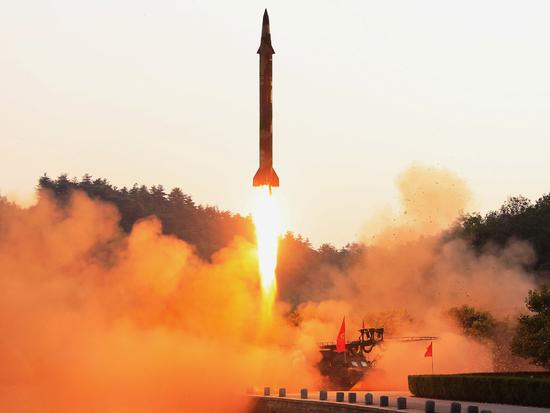


File Photo (Xinhua)
After DPRK’s recent intercontinental ballistic missile test, U.S. President Donald Trump took to social media to complain that China is doing nothing to help although China can “easily solve this problem.” Trump believes the “greatest immediate threat” to the U.S. is North Korea and that China can “easily solve this problem,” but the real question might be why North Korea feels the need to arm itself to the teeth.
In a commentary by the state-run North Korean government newspaper Minju Choson, North Korea accused the U.S. of developing an “insect-size micro robot weapon” to be used for a “beheading operation” against the regime. Although the newspaper’s claim cannot be independently verified, it is no secret at least some in the U.S. government desire to destroy the country, as U.S. Senator Lindsey Graham reminded the world on NBC News. “There is a military option to destroy North Korea’s program and North Korea itself.”
North Korea’s recent claim is, of course, one of many, but the overarching theme remains the same: In the eyes of North Korea, at least according to its media, the U.S. is determined to pursue military action against the country. It should be no surprise then that North Korea feels insecure, and this has led to a vicious cycle.
The case can be made that North Korean nuclear weapons are the only reliable deterrent to American aggression. In North Korea, they have an interesting children’s story about a peaceful community that feels threatened by a ruthless tiger. The story ends on a happy note, at least for North Korea, with the tiger running off with its tail between its legs after a brave porcupine steps up to accept the challenge. The underlying meaning is simple: The ultimate thing keeping the U.S. from ripping the country to pieces is its nuclear deterrent.
U.S. Secretary of State Rex Tillerson said the U.S. does not seek regime change in North Korea and would like to sit down and have dialogue about the future. But obviously, such statements are not credible to North Korea and do nothing to end the vicious cycle.
The solution to the dilemma is to not aggravate the explosive situation. Venting frustration over the failure of U.S. foreign policy; threatening economic coercion against China; and threatening the security of North Korea are only adding fuel to the fire. If the U.S. sincerely hopes China will help the U.S. solve its conflict with North Korea, then it should take seriously China’s “dual-track” approach and “suspension-for-suspension” proposal, which calls on North Korea to suspend its missile and nuclear activities in exchange for a less aggressive U.S. military posture, to help break out of the security dilemma and launch meaningful talks.
While China certainly has an important role to play in helping the two sides avoid a head-on collision, it is ridiculous to assume China has control over North Korea or is responsible for solving America’s security problem. Saying China can easily solve the problem is like saying peace in the Middle East is “not as difficult as people have thought”; and the so-called “China responsibility theory” is based on a poor understanding of the nuclear issue on the Korean Peninsula, as well as baseless efforts to shift responsibility for the complicated problem onto China and others.
If the U.S. aim is to promote peace and stability on the Korean Peninsula, then the region would be best served through collective efforts to create a situation in which the best formula for survival is not nuclear or other forms of hard power. But one thing is for certain: China is not to blame for North Korea’s missile and nuclear ambitions. As China has repeated over and over again, it is the U.S. and North Korea that hold the key to peace.
 Fire brigade in Shanghai holds group wedding
Fire brigade in Shanghai holds group wedding Tourists enjoy ice sculptures in Datan Town, north China
Tourists enjoy ice sculptures in Datan Town, north China Sunset scenery of Dayan Pagoda in Xi'an
Sunset scenery of Dayan Pagoda in Xi'an Tourists have fun at scenic spot in Nanlong Town, NW China
Tourists have fun at scenic spot in Nanlong Town, NW China Harbin attracts tourists by making best use of ice in winter
Harbin attracts tourists by making best use of ice in winter In pics: FIS Alpine Ski Women's World Cup Slalom
In pics: FIS Alpine Ski Women's World Cup Slalom Black-necked cranes rest at reservoir in Lhunzhub County, Lhasa
Black-necked cranes rest at reservoir in Lhunzhub County, Lhasa China's FAST telescope will be available to foreign scientists in April
China's FAST telescope will be available to foreign scientists in April "She power" plays indispensable role in poverty alleviation
"She power" plays indispensable role in poverty alleviation Top 10 world news events of People's Daily in 2020
Top 10 world news events of People's Daily in 2020 Top 10 China news events of People's Daily in 2020
Top 10 China news events of People's Daily in 2020 Top 10 media buzzwords of 2020
Top 10 media buzzwords of 2020 Year-ender:10 major tourism stories of 2020
Year-ender:10 major tourism stories of 2020 No interference in Venezuelan issues
No interference in Venezuelan issues
 Biz prepares for trade spat
Biz prepares for trade spat
 Broadcasting Continent
Broadcasting Continent Australia wins Chinese CEOs as US loses
Australia wins Chinese CEOs as US loses